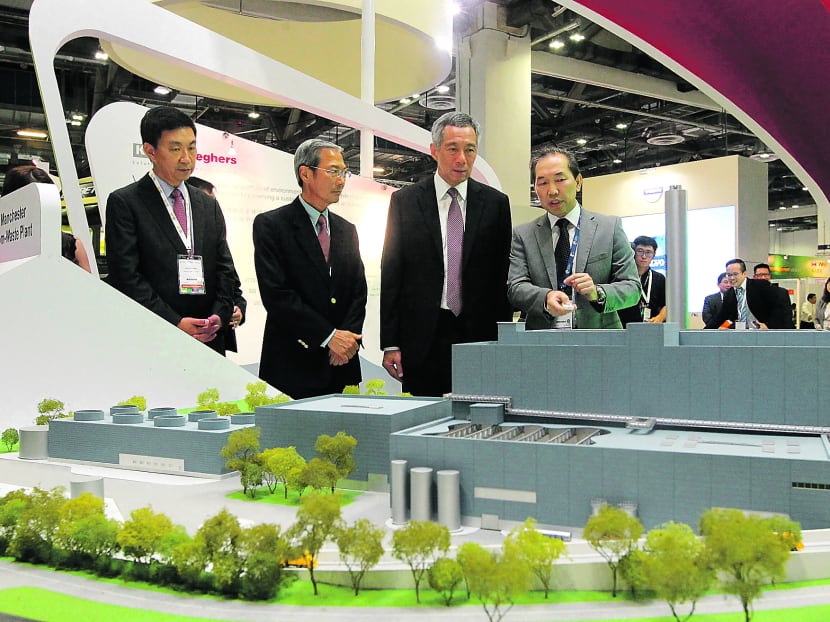Govt will learn from other cities to build better, smarter S’pore
SINGAPORE — As Singaporeans’ expectations of the liveability and sustainability of their city rise, the Government will continue learning from other cities to make the Republic a better home and smarter nation where citizens feel a strong sense of ownership, said Prime Minister Lee Hsien Loong.

Prime Minister Lee Hsien Loong (third from left) looking at exhibits at the World Cities Summit, Singapore International Water Week and CleanEnviro Summit Singapore yesterday. Photo: Don Wong
SINGAPORE — As Singaporeans’ expectations of the liveability and sustainability of their city rise, the Government will continue learning from other cities to make the Republic a better home and smarter nation where citizens feel a strong sense of ownership, said Prime Minister Lee Hsien Loong.
Improving Singapore was “a journey without the end”, said Mr Lee, who was speaking at the opening ceremony of the World Cities Summit, Singapore International Water Week and CleanEnviro Summit Singapore last night.
A better home can be created by making housing more affordable and public transport more reliable, integrating green spaces and waters into urban surroundings, strengthening social capital by integrating new immigrants with Singaporeans, creating more arts and cultural spaces as well as building a compassionate society, Mr Lee said.
“And to do this, we are studying other cities carefully — for example, London and its way of public transport, Copenhagen, which integrates pocket parks into its downtown, or Bilboa, which has had great success building its arts and cultural spaces,” he said.
Last month, the Government announced it was embarking on a bus contracting model that will see operators bidding for a package of routes through competitive tendering, akin to systems in London and Perth.
Thus far, Singapore has taken the long view in its development by “planning over generations, implementing programmes over several election terms and rallying Singaporeans to forgo some immediate gains for future dividends”, said Mr Lee, citing Marina Bay as a prime example. Once the mouth of a dirty river occupied by industries that caused pollution and slums, it is now “a jewel in our cityscape, a place all of us are very proud of”.
Yet, as cities drive economies and innovation, new challenges have emerged. “Climate change is causing unpredictable consequences (and) extreme weather, like the first snowfall in Cairo in a hundred years or flooding in London,” he said. “And so, we must continue to improve our cities and give our people a high-quality environment in which to live, work and play.”
Mr Lee said Singapore was also wiring up the island to deliver connectivity and enhance the business environment for a smarter nation. “There’s no place where you can hide from your emails and Facebook,” he said, adding that the country was also making better use of data to improve sustainability, such as in managing the nation’s power consumption more tightly.
Singapore is also strengthening citizens’ and residents’ ownership of their shared future through the use of technology, such as crowdsourcing and location-based services.
“There are many examples of how Singaporeans are working together to build a more liveable and sustainable Singapore. For example, preserving nature in Pulau Ubin — one of our bigger offshore islands — through the Ubin Project,” said Mr Lee.






